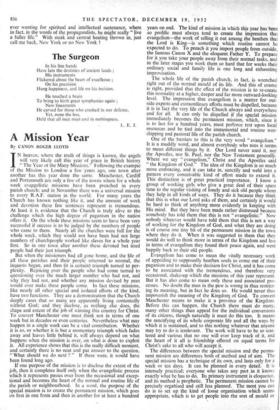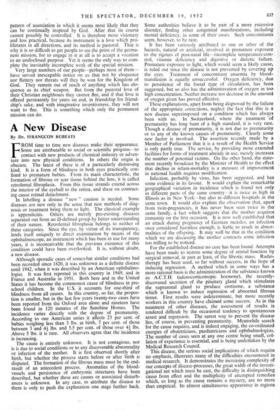A Mission Year
ByCANON ROGER LLOYD
IN heaven, where the truth of things is known, the angels will very likely call this year of grace in British history " The Year of the Many Missions." Following the example of the Mission to London a few years ago, one town after another has this year done the same. Manchester, Cardiff and Portsmouth are only a few of the towns where for a whole week evapgelistic missions have been preached in every parish church; and in November there was a universal mission to every R.A.F. station in the world. For many years the Church has known nothing like it, and the amount of work and devotion these few sentences represent is tremendous. At least it is evidence that the Church is truly alive to the challenge which the high degree of paganism in the nation offers it. On the whole these missions seem to have been very successful if success is to be judged by .the numbers of people who came to them. Nearly all the churches were full for the whole week, which they would not have been had not large numbers of churchpeople worked like slaves for a whole year first. So in one town after another these demoted but tired people had their just triumph. But when the missioners had all gone home, and the life of all these parishes and their people returned to normal, the inquests began, and then (it is certain) triumph turned to per- plexity. Rejoicing pver the people who had come turned to questioning over the much larger number who had not, and why they had not, and whether any mission devised by man would ever make these people come. In fact these missions, like nearly all other special and isolated efforts of the kind, have two functions. They are a demonstration that the Church deeply cares that so many are apparently living contentedly without God; and they disclose, as nothing else does, the shape and extent of the job of winning this country for Christ. To convert Manchester one must think not in terms of one week but in decades or even centuries. Nevertheless what may happen in a single week can be a vital contribution. Whether it is so, or whether it is but a momentary triumph which fades away and leaves little behind it, will always depend on what happens when the mission is over, on what is done to exploit it. All experience shows that this is the really difficult moment, and certainly there is no neat and pat answer to the question, " What should we do next ? " If there were, it would have been found long ago.
If one purpose of the mission is to disclose the extent of the job, then it completes itself only when the evangelistic process which it represents passes over from the occasional and excep- tional and becomes the heart of the normal and routine life of the parish or neighbourhood. In a word, the purpose of the special mission is to create the permanent mission, which goes on first in one form and then in another for at least a hundred years on end. The kind of mission in which this year has been so prolific must always tend to create the impression that evangelism—the work of telling it out among the heathen that the Lord is King—is something which routine cannot be expected to do. To preach it you import people from outside, the famous Canon X and the eloquent Father Y. To prepare for it you take your people away from their normal tasks, and in the later stages you work them so hard that for weeks their ordinary social and family life is one long and exhausting improvisation.
The whole life of the parish church, in fact, is wrenched right out of the normal mould of its life. And this of course is right, provided that the effect of the mission is to re-create this normality at a higher, deeper and far more outward-looking level. The impression that evangelism is a matter for out- side experts and extraordinary efforts must be dispelled, because it is in fact the very life of the Church always and everywhere and for all. It can only be dispelled if the special mission immediately becomes the permanent mission, which, since it is to last for a hundred years, must perforce rest upon local resources and be tied into the immemorial and routine wor- shipping and pastoral life of the parish church. One of the barriers to this is the very word " evangelism." It is a muddly word, and almost everybody who uses it seems to mean different things by it. Our Lord never used it, nor the Apostles, nor St. .Paul, nor the New Testament genera*. Where we say " evangelism," Christ and the Apostles said " the Kingdom of God." The idea of the Kingdom is so much more embracing, and it can take in, sanctify and weld into a pattern every conceivable kind of effort made to extend it. This distinction is of great practical importance. I know a group of working girls who give a great deal of their spare time to the regular visiting of lonely and sick old people whom they help in all kinds of ways. They do it because they think that this is what our Lord asks of them, and certainly it would be hard to think of anything more evidently in keeping with His mind. But they have been made rather distressed because somebody has told them that this is not " evangelistic." Now nobody whatever would have told them that this is not a way of working for the Kingdom of God, and what they are doing is of course one tiny bit of the permanent mission in the town where they do it. When it was suggested to them that they would do well to Think more in terms of the Kingdom and less in terms of evangelism they found their peace again, and went happily back to their old people.
Evangelism has come to mean the vitally necessary work of appealing to supposedly heathen souls to come out of their paganism and to make their decision for Christ, and it has come to be associated with the tremendous, and therefore very occasional, shake-up which the missions of this year represent. But it has also come to mean only these and associated pro- cesses. No doubt the man in the -pew is wrong in thus restrict- ing its meaning, but in fact he does so. He would never thus impoverish the meaning of the Kingdom of God. To convert Manchester means to make it a province of the Kingdom. Before this can happen, the Church there must do many, many other things than appeal for the individual conversions of its citizens, though naturally it must do this too. It means the sanctifying of its whole corporate life and all the ways by which it is sustained, and to this nothing whatever that anyone may try to do is irrelevant. The work will have to be so scat- tered and various that no one will ever keep track of it, and the heart of it all is friendship offered on equal terms for Christ's sake to all who will accept it.
The differences between the special mission and the perma- nent mission are differences both of method and of aim. The special mission has a-technique of its own, and lasts only for a week or ten days. It can be planned in every detail. It is intensely practical; everyone who takes any part in it knows exactly what he has to do. Its primary instrument is eloquence, and its method is prophetic. The permanent mission cannot be precisely organised and still less planned. The most you can do is to set up the kind of loose organisation which seems appropriate, which is to get people into the sort of mould or pattern of association in which it seems most likely that they can be continually inspired by God. After that its course cannot possibly be controlled. It is therefore more visionary and less practical, because its instrument is a love which pro- liferates in all directions, and its method is pastoral. That is why it is so difficult to get people to see the point of the perma- nent mission, for to engage in it at all is to accept a vocation to an undisclosed purpose. Yet it seems the only way to com- plete the inevitably incomplete work of the special mission. Very large numbers of our people—perhaps most of them— have served inescapable notice on us that not by eloquence nor flattery nor threats will they be won for the Kingdom of God. They remain out of reach of anything which has elo- quence as its chief weapon. But from the pastoral love of their Christian neighbours they cannot flee, and if that love is offered persistently for years on end, in friendship for friend- ship's sake, and with imaginative inventiveness, they will not want to flee. This is something which only the permanent mission can do.



































 Previous page
Previous page